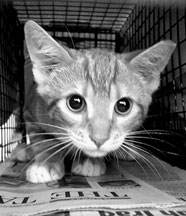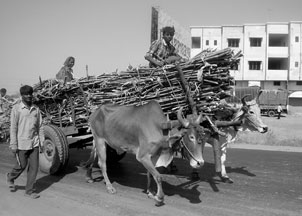|
Needed:
Tougher animal welfare laws
 Have
you seen the line 'No animals were harmed during the production of this
movie' at the end credits of Hollywood movies and TV series ? That shows
the seriousness with which they treat the subject of animal welfare.
Animal cruelty is treated as a very serious offence, almost on par with
harming or injuring a human being. There are stringent laws to deter
animal cruelty - and ensure animal welfare. Humane methods have to be
followed in the case of animals slaughtered for meat. Have
you seen the line 'No animals were harmed during the production of this
movie' at the end credits of Hollywood movies and TV series ? That shows
the seriousness with which they treat the subject of animal welfare.
Animal cruelty is treated as a very serious offence, almost on par with
harming or injuring a human being. There are stringent laws to deter
animal cruelty - and ensure animal welfare. Humane methods have to be
followed in the case of animals slaughtered for meat.
Unfortunately for a country in which the four major religions are
very prominent, Sri Lanka's record in this regard leaves a lot to be
desired. Animal welfare laws nominally exist, but they are observed more
in the breach. Western countries are far more advanced than Asian
countries in this department. After all, one of gauging how civilized a
society is, is looking at how it treats animals.
Horrendous methods of slaughter are used even in our licensed
abattoirs and one can only imagine the things they do to animals in the
illegal ones. There have been many attempts to introduce humane methods,
but they have been unsuccessful so far. There have also been attempts to
restrict or even ban especially the slaughter of cattle in the context
of religious and cultural sensibilities. This matter should be looked
into again, but the introduction of humane methods of slaughter for all
animals raised for meat is essential. The authorities must move quickly
on this issue and enact the relevant regulations.
 Another
serious issue concerns stray dogs and cats. There probably are millions
of them in our streets, though stray dogs far outnumber cats. It is only
in recent times that local bodies have thought about controlling the
feral dog population through humane, non-destructive methods instead of
the infamous gas chambers. Another
serious issue concerns stray dogs and cats. There probably are millions
of them in our streets, though stray dogs far outnumber cats. It is only
in recent times that local bodies have thought about controlling the
feral dog population through humane, non-destructive methods instead of
the infamous gas chambers.
The non-sterilisation of stray animals and even domestic cats and
dogs is one of the factors that leads to the proliferation of stray
animals. Many animal owners simply do not care to sterilize female cats
and dogs and just dump their litter on the road afterwards. This is
uncivilized, even criminal behaviour that no person who loves animals
can condone. Emaciated stray pups and kittens is a sore sight and a blot
on the moral values we cherish. In a more practical sense, it leads to
the spread of diseases such as rabies among the human population. It is
far better to prevent rabies in the first place than spend millions of
rupees on vaccinations and treatment. Stray animals, including cattle,
foraging through garbage dumps is another serious issue.
Earlier, many local bodies and animal welfare organisations jointly
organised sterilization and vaccination clinics in cities and towns
islandwide, so that owners could bring their animals in for vaccination.
We rarely hear of such camps now. The Central Government and provincial
councils should financially assist local bodies to begin such camps
again. That is essential for the prevention of a population explosion in
stray animals as well as the spread of rabies.
We have also seen animals, including exotic birds and fish, being
sold by the roadside. They are kept in squalid conditions - the cages
are crowded, tiny and filthy, very little food and water are provided
(if at all), the bigger fish struggle to breathe and move about in their
small polythene sacks and the animals have no shelter in case of rain.
Apart from inhumane slaughter, there is no bigger example for animal
cruelty. There was one news item around one year ago that such a trader
was nabbed by wildlife officials but that probably was the end of the
matter. We can see many such traders in the suburbs of Colombo. The
authorities should look into this practice again.
Perhaps the authorities should take a cue from the 'pet shop'
concept, practised in many countries. They have animal shelters
(primarily housing stray animals which are given away to good homes
either free or for a nominal charge) as well as licensed 'pet shops'
which sell pets. The animals are well fed, kept under good conditions
and all medications/vaccinations are given. These facilities are
supervised by veterinary surgeons at regular intervals. Similar concepts
can be introduced here.
 Poaching
is another major animal rights/welfare issue. Worldwide, there is a
mass-scale trade in live wild animals and animal parts and poaching
gangs based in Sri Lanka also contribute their share. Our sanctuaries
and national parks are not fully secure and it is difficult to track
down poachers. Wildlife Dept manpower resources are stretched to the
limit as well. An action plan is needed to stop poaching and illegal
pleasure hunting in our protected areas. It appears that the fines and
jail sentences given for these offences are hardly adequate in the
present context. The authorities should review these deterrent measures. Poaching
is another major animal rights/welfare issue. Worldwide, there is a
mass-scale trade in live wild animals and animal parts and poaching
gangs based in Sri Lanka also contribute their share. Our sanctuaries
and national parks are not fully secure and it is difficult to track
down poachers. Wildlife Dept manpower resources are stretched to the
limit as well. An action plan is needed to stop poaching and illegal
pleasure hunting in our protected areas. It appears that the fines and
jail sentences given for these offences are hardly adequate in the
present context. The authorities should review these deterrent measures.
More legal measures must be brought to ensure that owners take due
care of domestic animals. Most countries have introduced animal collars
with a computer chip containing the owner's information and telephone
numbers. These are compulsory for cats and dogs.
In case the animal goes missing or is lost and then found, the
authorities can always trace the owners for a happy reunion.This might
appear to be an expensive proposition, but animal owners can be asked to
foot at least part of the bill as it will ultimately benefit them. After
all, those who really love their pets will want some sort of 'insurance'
of this nature.
The authorities should also introduce measures for the welfare of
working animals such as cattle and elephants. These animals toil hard
for their owners throughout the day but some owners do not take good
care of them in terms of food and rest. This too cannot be condoned in a
civilized society. Sri Lanka needs a drastic revamp of its animal
welfare laws to fall in line with the rest of the world. The authorities
should study the animal welfare laws practised in other countries and
adopt those suitable for our country and culture.
|

